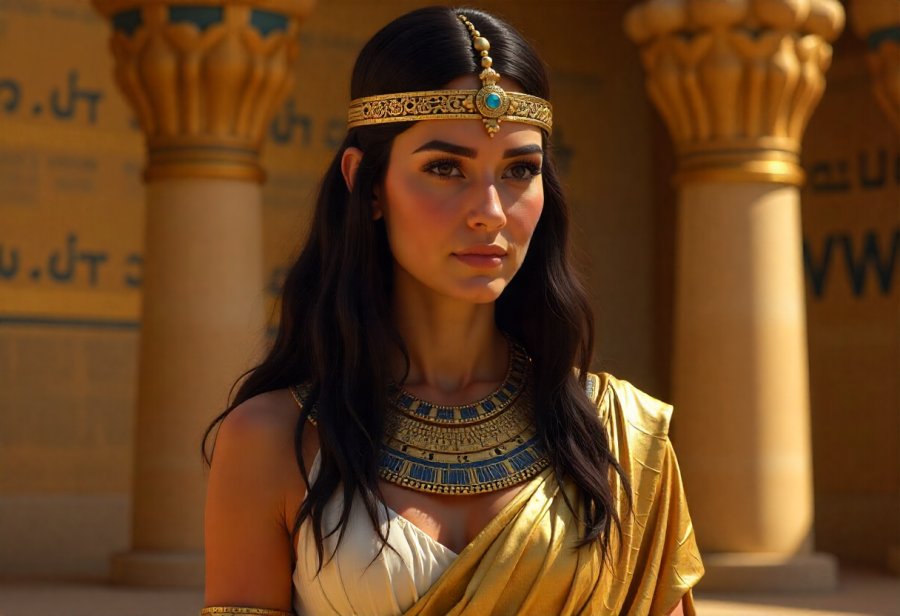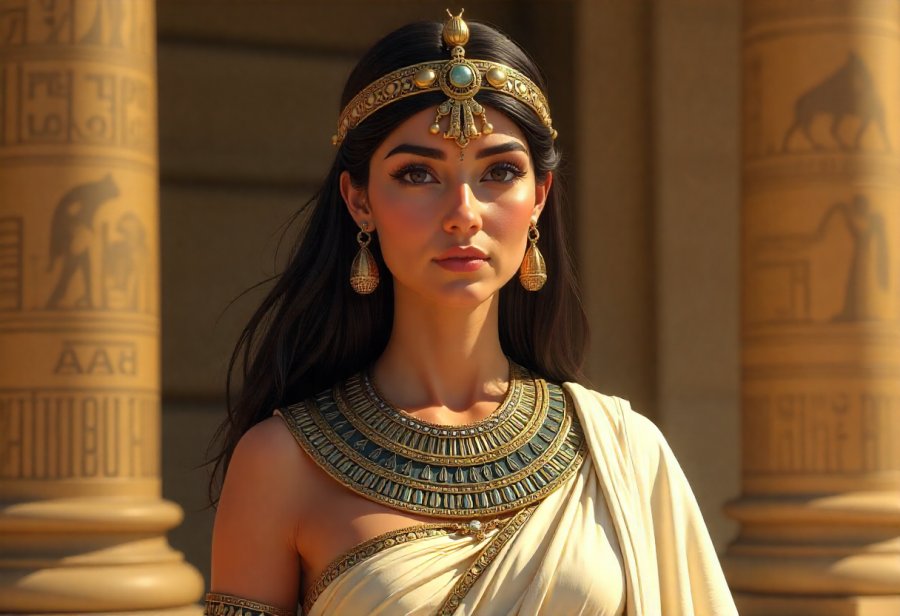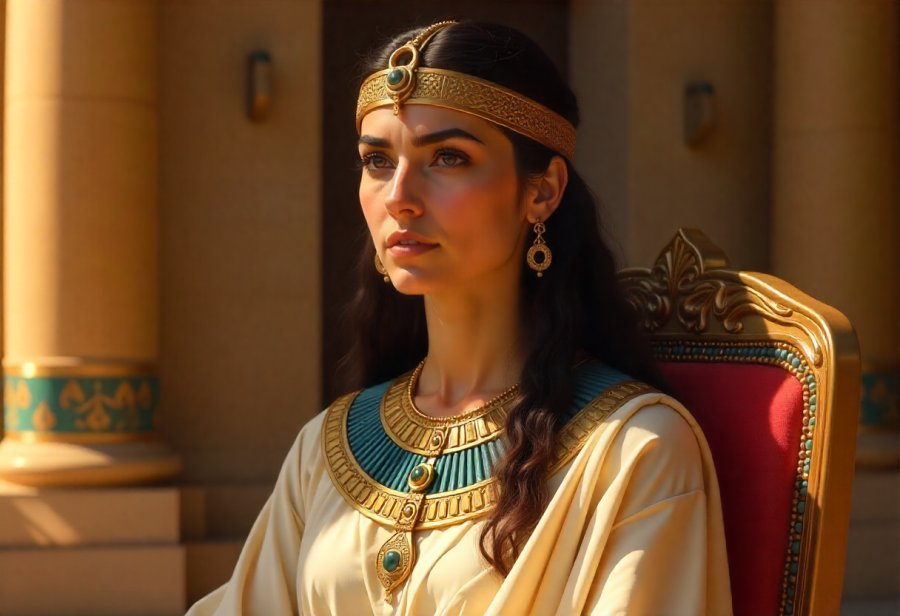Cleopatra VII is often remembered through romanticized portrayals, yet her true legacy lies in her formidable intellect, diplomatic mastery, and cultural sophistication. This deep, strategic mind enabled her to navigate a turbulent political landscape, forging alliances with Rome’s greatest leaders while maintaining Egypt’s independence. Fluent in multiple languages and deeply engaged with sciences and philosophy, Cleopatra transformed Alexandria into a hub of knowledge and innovation. Her leadership was rooted in wisdom, perception, and resilience—using symbols, diplomacy, and cultural diplomacy to reinforce her authority. Her story challenges us to reconsider what truly defines power: is it appearance and allure, or the enduring strength of the mind? Cleopatra’s ability to blend tradition with innovation, leveraging knowledge as her real strength, leaves a timeless lesson in visionary leadership. Could her legacy be a testament to the power of intellect and strategic thinking—forces that shape history far beyond the throne?

Unveiling Cleopatra’s True Power: Intelligence and Diplomacy Over Beauty
Cleopatra VII is often remembered through Hollywood’s glamorous portrayals, but her true strength went far beyond her beauty or romantic tales. At the core of her power was a sharp mind and a mastery of politics that kept her reign afloat amid chaos. She was a highly educated leader who understood the complexities of her world, using her intelligence to navigate a turbulent political landscape. Her ability to think strategically and wield influence through diplomacy set her apart from many of her contemporaries.
Her education was exceptional, especially for a woman of her time. Fluent in Egyptian, Greek, Latin, and Aramaic, Cleopatra could communicate directly with foreign diplomats and leaders, giving her a clear diplomatic advantage. This linguistic skill allowed her to negotiate with confidence and subtlety, making her a formidable player on the international stage. Her dedication to learning extended beyond languages—she studied sciences, philosophy, and governance, engaging with Alexandria’s legendary Library and its vast collection of knowledge.
This intellectual foundation shaped her leadership style. Instead of relying solely on traditional royal authority, Cleopatra applied scientific and philosophical insights to her policies, viewing knowledge as a vital resource. Her patronage of scholars and scientists turned Alexandria into a hub of innovation, helping Egypt modernize and strengthen its position. Her emphasis on education and cultural richness reinforced her image as a ruler who valued wisdom, making her influence rooted in her mind as much as her throne.
Cleopatra’s legacy is a reminder that true power isn’t just about appearance or force, but about understanding the world deeply. Her mastery of languages, her scholarly pursuits, and her ability to adapt to changing circumstances enabled her to maintain her independence and influence for decades. She was a leader who proved that intellectual strength and strategic thinking could shape history, leaving a lasting mark that continues to inspire debates about what it truly means to be a powerful ruler.
The Making of a Scholar-Queen: Mastering Languages and Embracing Knowledge
Cleopatra’s education was extraordinary for her time, setting her apart as a truly remarkable ruler. Fluent in Egyptian, Greek, Latin, and Aramaic, she could converse directly with foreign diplomats, scholars, and leaders without the need for interpreters. This linguistic mastery gave her a significant diplomatic edge, allowing her to negotiate with nuance and confidence. Her ability to speak multiple languages reflected a deliberate effort to understand and respect different cultures—a vital skill in the complex politics of the Mediterranean world.
But Cleopatra’s intellectual pursuits extended well beyond languages. She had a deep interest in sciences like astronomy, medicine, and mathematics. She studied these disciplines closely, often engaging with scholars and philosophers at Alexandria’s legendary Library, a hub of knowledge and innovation. Her curiosity and scholarly engagement helped her develop a nuanced understanding of the world, blending scientific thinking with political strategy.
This foundation of learning influenced her leadership style profoundly. Rather than relying solely on traditional royal authority, Cleopatra applied insights from philosophy and science to craft policies rooted in reason and wisdom. She understood that effective governance required more than just power; it demanded insight into human nature, culture, and technological progress. Her scholarly interests also sharpened her ability to anticipate political shifts, helping her navigate threats and seize opportunities before they materialized.
Her connection to Alexandria’s Library exemplifies her dedication to knowledge. She saw learning as a vital resource for Egypt’s modernization and strength. By fostering an environment where scholars, scientists, and artists could collaborate, she transformed Alexandria into a vibrant center of innovation. Her patronage elevated Egypt’s cultural and intellectual standing, reinforcing her reputation as a ruler who valued enlightenment and education.
Cleopatra’s scholarly pursuits made her more than a traditional monarch—she was a visionary leader whose strength was rooted in her mind. Her multilingual abilities, scientific interests, and support for learning institutions allowed her to adapt and thrive amid shifting political landscapes. She understood that knowledge was a form of power capable of outlasting military might or territorial conquest. Her legacy as a scholar-queen continues to inspire, exemplifying how intellectual depth and curiosity can define true leadership.

Applying Cleopatra’s Lessons Today: Timeless Strategies for Modern Leaders
Cleopatra’s leadership offers timeless lessons that remain highly relevant in today’s complex world. Her ability to build alliances through diplomacy rather than force highlights the importance of understanding people and situations deeply. Modern leaders can learn from her skill in reading cultural nuances and leveraging relationships to create trust and mutual benefit. This approach proves more effective and sustainable than relying solely on power or confrontation.
Her knack for blending tradition with innovation also holds valuable insights. Cleopatra respected Egyptian customs while embracing new ideas from Greek culture and scientific knowledge. This flexibility allowed her to maintain legitimacy while adapting to changing circumstances. Today’s organizations and leaders benefit from this mindset—honoring core values while remaining open to fresh perspectives and technological advances to stay resilient in uncertain environments.
Curiosity and continuous learning were core to Cleopatra’s success. She recognized that well-informed decisions depend on understanding broader contexts—whether political shifts, scientific developments, or cultural trends. By fostering environments where diverse expertise could collaborate, she kept Alexandria at the forefront of innovation. Modern leaders can emulate this by investing in education, encouraging diverse viewpoints, and staying curious about global trends and emerging opportunities.
Another key lesson lies in her mastery of symbolism and perception. Cleopatra used religious imagery and cultural symbols skillfully to reinforce her authority and inspire loyalty. This demonstrates how perception often shapes reality—effective communication and cultural awareness can strengthen trust and legitimacy. Today’s leaders should prioritize culturally aware messaging that aligns with shared values, helping to foster a unified sense of purpose and confidence.
Finally, Cleopatra’s resilience and strategic patience stand out. Even amid external threats and internal rivalries, she remained focused and adaptable. Her ability to read the landscape, adjust her tactics, and stay committed to her long-term vision exemplifies the importance of emotional resilience and strategic thinking. Her story encourages modern leaders to embrace intellectual agility and perseverance, especially when navigating crises or periods of decline. Her legacy reminds us that influence rooted in knowledge, cultural insight, and resilience can shape history just as powerfully as force or wealth.
Embracing these lessons can help modern leaders foster stronger connections and adapt more effectively to today’s challenges. For those interested in exploring more about leadership strategies rooted in history, you can learn from Cleopatra’s timeless approach by checking out this comprehensive analysis of her leadership here.
Expert Insights: Scholars Reveal Cleopatra’s Lasting Impact and Diplomatic Genius
Scholars and historians often view Cleopatra’s legacy through a nuanced lens, emphasizing her unique blend of intellect, diplomacy, and cultural influence. Rather than focusing solely on her romanticized image, they highlight her strategic prowess in forging alliances and maintaining Egypt’s independence amid the rising tide of Rome. Her diplomatic skill was rooted in a keen understanding of her opponents’ motivations and the broader geopolitical landscape, enabling her to turn potential threats into opportunities. This political savvy continues to earn her respect as a master strategist, well ahead of her time.
While some critics point to the external pressures and internal rivalries that eventually undermined her reign, most agree her influence extended far beyond the political scene. Cleopatra’s leadership was rooted in her mastery of languages, her patronage of Alexandria’s legendary Library, and her deep engagement with philosophy and sciences. These attributes reveal a ruler whose power was as much built on cultural sophistication and knowledge as on territorial control. Her ability to leverage intellectual and cultural resources helped her shape a lasting legacy that goes beyond mere conquest.
Her relationships with Julius Caesar and Mark Antony exemplify her diplomatic finesse. These alliances weren’t driven solely by personal motives but were carefully crafted political moves designed to preserve Egypt’s sovereignty. Cleopatra understood the importance of cultural symbolism, using divine imagery and traditional rituals to legitimize her authority. Her mastery of perception and symbolism created an enduring image of legitimacy and strength—one that resonated with her people and her allies alike, reinforcing her influence in both political and spiritual realms.
Her impact on Alexandria as a hub of learning and innovation remains a key part of her legacy. By patronizing scholars and scientists, she transformed Egypt into a beacon of knowledge—an environment where ideas flourished and scientific progress was supported. Cleopatra recognized that knowledge was a vital resource, capable of outlasting armies and borders. Her commitment to fostering intellectual growth helped cement her reputation as a ruler who valued education and enlightenment, making her influence felt long after her reign ended.
Despite the external pressures from Rome and internal challenges, Cleopatra’s resilience and strategic patience kept her influence alive. Her ability to read shifting landscapes, adapt her tactics, and stay focused on her long-term goals exemplifies leadership rooted in intellectual agility and emotional resilience. Her story reminds us that influence is often rooted in wisdom, cultural insight, and perseverance—traits that continue to inspire modern leaders to value knowledge and strategic thinking as the true sources of enduring power.

Legacy of the Scholar-Queen: Wisdom, Resilience, and Cultural Diplomacy That Shaped History
Cleopatra’s legacy endures because she demonstrated that true power comes from the mind as much as from the throne. Her story challenges the myth that leadership is solely about beauty or romantic intrigue, highlighting instead the importance of knowledge, diplomacy, and cultural sophistication. By blending Egyptian traditions with Greek learning and forging strategic alliances, she showed that influence rooted in wisdom and perception can shape history far beyond her lifetime.
Her leadership was grounded in a profound understanding of the world around her. Fluent in multiple languages and well-versed in sciences, philosophy, and governance, Cleopatra used her broad knowledge to navigate complex political landscapes. Her patronage of Alexandria’s legendary Library and her support for scholars positioned her as a ruler who recognized that learning is a vital resource—one capable of outlasting armies and empires. Her ability to adapt her strategies based on cultural and scientific advances kept her influence resilient, even amid external threats.
What made Cleopatra stand out was her capacity to balance tradition with innovation. She respected Egyptian religious customs while embracing Greek political ideas, creating a dynamic form of legitimacy that resonated with her people and allies alike. Her skill in cultural diplomacy and her mastery of divine symbolism reinforced her authority and inspired loyalty, allowing her to project strength without solely relying on military might. This mastery of perception and symbolism made her a leader whose influence was as much about insight as force.
Her relationships with Julius Caesar and Mark Antony exemplify her diplomatic finesse. These alliances weren’t just personal; they were strategic moves designed to preserve Egypt’s independence and influence. Cleopatra’s ability to leverage her understanding of Roman politics and her negotiation skills turned potential threats into opportunities, extending her reach far beyond Egyptian borders. Her use of cultural and religious symbolism further cemented her legitimacy, creating an enduring image of authority rooted in both perception and substance.
Despite external pressures and internal rivalries, Cleopatra’s resilience and strategic patience kept her influence alive. Her keen sense of timing and her ability to read shifting political landscapes allowed her to adjust tactics and maintain relevance. Her story illustrates that leadership rooted in intellectual agility and emotional resilience can withstand even the most daunting challenges, proving that influence is often sustained through perseverance and adaptability.
Her true legacy lies in her mastery of cultural, diplomatic, and intellectual domains. Cleopatra demonstrated that leadership built on knowledge, cultural insight, and resilience leaves a lasting imprint—one that continues to inspire centuries later. Her life encourages modern leaders to value education, foster diplomacy, and approach challenges with intelligence and patience. Her example shows that the most enduring power is, indeed, the power of the mind, capable of shaping history long after the throne has passed.







